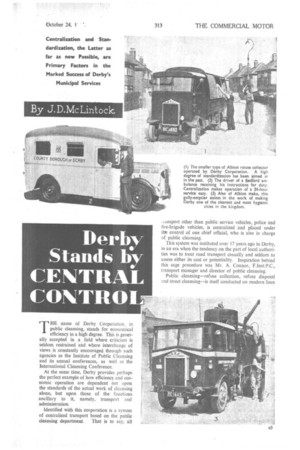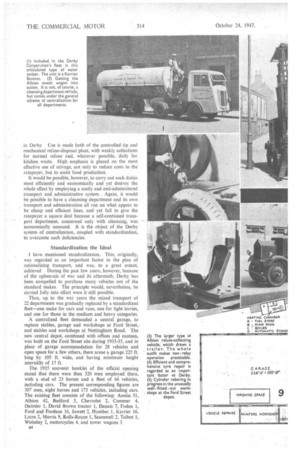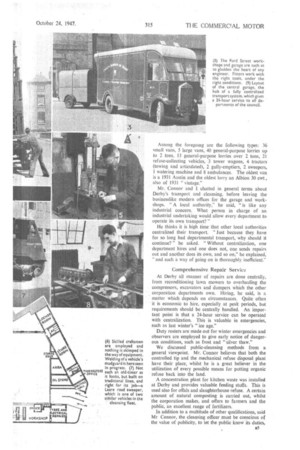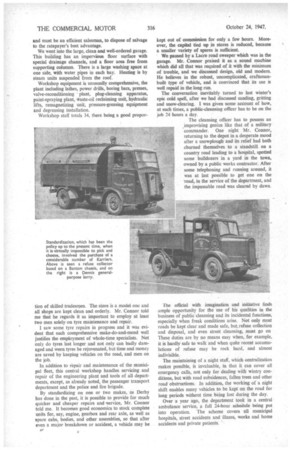Centralization and Standardization, the Latter as far as now Possible,
Page 37

Page 38

Page 39

Page 40

If you've noticed an error in this article please click here to report it so we can fix it.
are Primary Factors in the Marked Success of Derby's Municipal Services
THE name of Derby Corporation. in public cleansing, stands for economical efficiency in a high degree. This is generally accepted in a field where criticism is seldom restrained and where interchange of views is constantly encouraged through such agencies as the Institute of Public Cleansing and its annual conferences, as well as the International Cleansing Conference.
At the same time, Derby provides perhaps the perfect example of how efficiency and economic operation are dependent not upon the standards of the actual work of cleansing alone, but upon those of the functions ancillary to it, namely, transport and administration.
Identified with this corporation is a system of centralized transport based on the public
cleansing department. That is to say, all
Jansport other than public service vehicles, police and fire-brigade vehicles, is centralized and placed under the control of one chief official, who is also in charge of public cleansing.
This system was instituted over 17 years ago in Derby, in an era when the tendency on the part of local authorities was to treat road transport casually and seldom to assess either its cost or potentiality. Inspiration behind this sage procedure was Mr. A. Connor, F.Inst.P.C., transport manager and director of public cleansing.
Public cleansing—refuse collection, refuse disposal and street cleansing—is itself conducted on modern lines
in Derby Use is made both of the controlled tip and mechanical refuse-disposal plant, with weekly collections for normal refuse and, wherever possible, daily for, kitchen waste. High emphasis is placed on the most effective use of salvage, not only to reduce costs to the
ratepayer, but to assist food production.
It would be possible, however, to carry out such duties most efficiently and economically and yet destroy the whole effect by employing a costly and mal-administered transport and administrative system„ Again, it would be possible to have a cleansing department and its own transport and administration all run on what appear to be cheap and efficient lines, and yet fail to give the ratepayer a square deal because a self-contained transport department, 'concerned only With cleansing, was economically unsound. It is the object of the Derby system of centralization, coupled with standardization, to overcome such deficiencies.
Standardization the Ideal
I have mentioned standardization. This, originally, was regarded as an important factor in the plan of rationalizing transport, arid was, to a great extent, achieved During the past few years, however, because of the upheavals of war and its aftermath, Derby has been compelled to purchase many vehicles not of the standard makes. The principle would, nevertheless, be carried fully into effect were it still possible.
Thus, up to the war years the mixed transport of 22 departments was gradually replaced by a standardized fleet—one make for cars and vans, one for light lorries, and one for those in the medium and heavy categories. A centralized fleet demanded a central garage, to replace stables, garage and workshops at Ford Street, and stables and workshops at Nottingham Road. The new central depot, combined with offices and canteen, was built on the Ford Street site during 1933-35, and in place of garage accommodation for 28 vehicles and open space for a few others, there arose a garage 225 ft. long by 105 ft. wide, and having minimum height internally of 17 ft.
The 1935 souvenir booklet of the official opening stated that there were then 320 men employed there, with a stud of 23 horses and a fleet of 66 vehicles, including cars. The present corresponding figures are 307 men, eight horses and 173 vehicles, including cars. The existing fleet consists of the following: Austin 51, Albion 42, Bedford 5, Chevrolet 2, Commer 4, Daimler 1, David Brown tractor I. Dennis 7, Foden 1, Ford and Fordson 16, Jowett 2, Humber, 1, Karrier 16, Lacre 2, Morris 9, Rolls-Royce 1, Seammell 2, Talbot 1, Wolseley 2, motorcycles 4, and tower wagons 3
Among the foregoing arc the following types: 36 small vans, 5 large vans, 40 general-purpose lorries up to 2 tons, 13 general-purpose lorries over 2 tons, 21 refuse-collecting vehicles, 3 tower wagons, 4 tractors (towing and articulated), 2 gully-emptiers, 2 sweepers, 1 watering machine and 8 ambulances. The oldest van is a 1931 Austin and the oldest lorry an Albion 30 cwt, also of 1931 " vintage."
Mr. Connor and I chatted in general terms about Derby's transport and cleansing, before leaving the businesslike modern offices for the garage and workshops. "A local authority," he said, "is like any industrial concern. What person in charge of an industrial undertaking would allow every department to operate its own transport?"
He thinks it is high time that other local authorities centralized their transport. "Just because they have for so long had departmental transport, why should it continue?" he asked. "Without centralization, one department hires and one does not, one sends repairs out and another does its own, and so on," he explained, "and such a way of going on is thoroughly. inefficient."
Comprehensive Repair Service At Derby all manner of repairs are done centrally,
from reconditioning lawn mowers to overhauling the compressors, excavators and dumpers which the other
_ corporation departments own. Hiring, he said, is a matter which depends on circumstances. Quite often it is economic to hire, especially. at peak periods, but requirements should be centrally handled. An important point is that a 24-hour service can be operated with centralization. This is valuable in emergencies, such as last winter's "ice age."
Duty rosters are made .out for winter emergencies and observers are employed to give early notice of dangerous conditions, such as frost and "silver thaw."
We discussed public-cleansing methods from a general Viewpoint. Mr. Connor believes that both the controlled tip and the mechanical refuse disposal plant have their place, whilst he is a great believer in the utilization of every possible means for putting organic refuse back into the land.
A concentration plant for kitchen waste was installed at Derby and provides valuable feeding stuffs. This is used also for offals and slaughterhouse refuse. A certain amount of natural composting is carried out, whilst the corporation makes, and offers to farmers and the public, an excellent range of fertilizers.
In addition to a multitude of other qualifications, said Mr Connor, the cleansing officer must be conscious of the value of publicity, to let the public know its duties, and must be an efficient salesman, to dispose of salvage to the ratepayer's best advantage.
We went into the large, clean and well-ordered garage. This building has an impervious floor surface with special drainage channels, and a floor area free from supporting columns. There is a large washing space at one side, with water pipes in each bay. Heating is by steam units suspended from the roof.
Workshop equipment is unusually comprehensive, the plant including lathes, power drills, boring bars, presses, valve-reconditioning plant, plug-cleaning apparatus, paint-spraying plant, Waste-oil reclaiming unit, hydraulic remagnetizing unit, pressure-greasing equipment and degreasing installation.
Workshop staff totals 34, there being a good propor tion of skilled tradesmen. The store is a model one and all shops are kept clean and orderly. Mr. Connor told me that he regards it as important to employ at least two men solely on tyre maintenance and repair.
I saw some tyre repairs in progress and it was evident that such comprehensive make-do-and-mend well justifies the employment of whole-time specialists. Not only do tyres last longer and not only can badly damaged and worn tyres be rejuvenated, but time and money are saved by keeping vehicles on the road, and men on the job.
In addition to repair and maintenance of the municipal fleet, this central workshop handles servicing and repair of the engineering plant and tools of all departments, except, as already noted, the passenger transport department and the police and fire brigade.
By standardizing on one or two makes, as Derby has done in the past, it is possible to provide for much quicker and cheaper repairs and -service, Mr. Connor told me. It becomes good economics to stock complete units for, say, engine, gearbox and rear axle, as well as spare cabs, bodies, and other assemblies, so that after even a major breakdown or accident, a vehicle may be
P4
kept out of commission for only a few hours. Moreover, the capital tied up in stores is reduced, because a smaller variety of spares is sufficient.
We paused by a Lacre road sweeper which was in the garage. Mr. Connor praised it as a sound machine which did all that was required of it with the minimum of trouble, and we discussed design, old and modern. He believes in the robust, uncomplicated, craftsmanbuilt type of vehicle, and is convinced that its use is well repaid in the long run.
The conversation inevitably turned to last winter's epic cold spell, after we had discussed sanding, gritting and snow-clearing. 1 was given some account of how, at such times, a public-cleansing officer has to be on the job 24 hours a day.
The cleansing officer has to possess an improvising genius like that of a military commander. One night Mr. Connor, returning to the depot in a desperate mood after a snowplough and its relief had both churned themselves to a standstill on a country road leading to a hospital, spotted some bulldozers in a yard in the town, owned by a public works contractor. After some telephoning and running around, it was at last possible to get one on the road, in the service of the department, and the impassable road was cleared by dawn.
The official with imagination and initiative finds ample opportunity for the use of his qualities in the business of public cleansing and its incidental functions, especially when freak conditions arise. Not only must roads be kept clear and made safe, but refuse collection and disposal, and even street cleansing, must go on These duties are by no means easy when, for example, it is hardly safe to walk and when quite recent accumulations of refuse may be rock hard, and almost indivisible.
The maintaining of a night staff, which centralization makes possible, is invaluable, in that it can cover all emergency calls, not only for dealing with wintry conditions, but with road subsidences, fallen trees and other road obstructions. In addition, the working of a night shift enables many vehicles to be kept on the road for long periods without time being lost during the day.
Over a year ago, the department took in a central ambulance service, a full 24-hour schedule being put into operation. The scheme covers all municipal hospitals, street accidents and illness, works and home accidents and private patients.
















































































